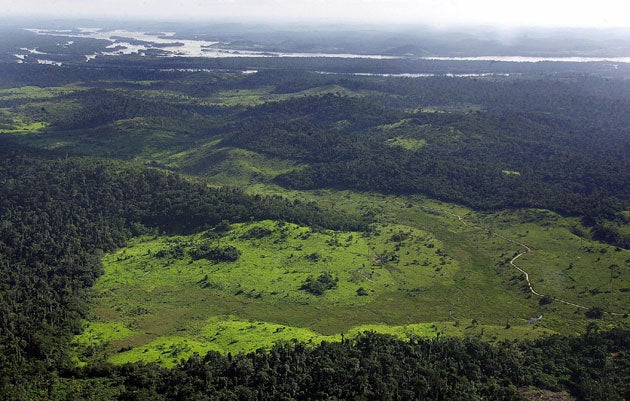Campaign to put ecocide on a par with genocide in attempt to curb environmental destruction
Grassroots movement wants the International Criminal Court to prosecute offenders

A global campaign to make "ecocide" a crime under international law is to be launched tomorrow in an attempt to outlaw the worst kinds of environmental destruction.
A grassroots movement called End Ecocide on Earth is seeking to have the wholesale destruction of ecosystems ranked alongside offences such as genocide and war crimes. The International Criminal Court (ICC) would then be able to prosecute companies over major pollution incidents, such as the oil spills that have contaminated large areas of the Niger Delta region for half a century.
The campaign, which will be launched at a conference on ecocide in Brussels, is the latest in a long-running drive dating back to the 1970s to create tougher global environmental safeguards.
Although it was one of the five core crimes covered by the Rome Statute that set up the ICC, ecocide mysteriously vanished from negotiations at the United Nations. An academic who has studied the process said he had been unable to find out why, but suspects that lobbying by the nuclear industry may have been influential.
The End Ecocide in Europe campaign has gathered more than 170,000 signatures in support of creating a law in the European Union. The petition is to be presented to the European Parliament in the hope that MEPs will back the idea and persuade the European Commission to issue a directive.
Prisca Merz, one of the founders of the campaign, said that the plan is to build a truly global grassroots movement to put pressure on world leaders. "The destruction of the planet is proceeding at such a fast pace … soon we won't have clean air or clean water any more and our children will not have a healthy environment to live in," she said.
"I look at where we will be in 50 years and it's quite a disastrous outlook. We need to act fast. That's the beauty of this law. It is just one law, but the impact it will have on the way we do business will be enormous," she added.
In addition to the Niger Delta oil spills, Ms Merz said the law could potentially be used to punish companies over pollution caused by oil extraction at Canada's tar sands and incidents such as the 2010 Deepwater Horizon disaster.
The campaigners are looking for a signatory to the Rome Statute – the UK and most EU countries are – to put forward the idea of an international law. They would then need to convince two-thirds of the signatories – more than 80 states – to have it included in the treaty.
Dr Damien Short, an academic who has studied the statute, said an ecocide law had been "seriously considered" by the UN and was included in a draft of the Rome Statute. However, he said his research hit a number of "dead ends", one of which was the reasons behind the demise of the ecocide law.
"The only little bit we picked up was that the nuclear lobby had a hand in it," said Dr Short, who will speak at the Brussels meeting. "With the UN, you're never really fully aware of why decisions were made."
The Niger Delta is one of the most polluted places on Earth: oil spills there have been a fact of life for about 50 years. A UN Environment Programme report in 2011 found that public health in parts of Ogoniland was "severely threatened" by contaminated drinking water. In one area, an 8cm layer of refined oil was found floating on groundwater that served a number of water wells. Shell is currently being sued in the UK courts by thousands of local people from the Niger Delta over some of the spills that have contaminated the region.
A spokesman for Shell said the company took spills "very seriously", but said most in the Niger Delta were the result of "criminal activity". "There are laws in Nigeria which are designed to deal with that," he said.
Join our commenting forum
Join thought-provoking conversations, follow other Independent readers and see their replies
Comments
Bookmark popover
Removed from bookmarks